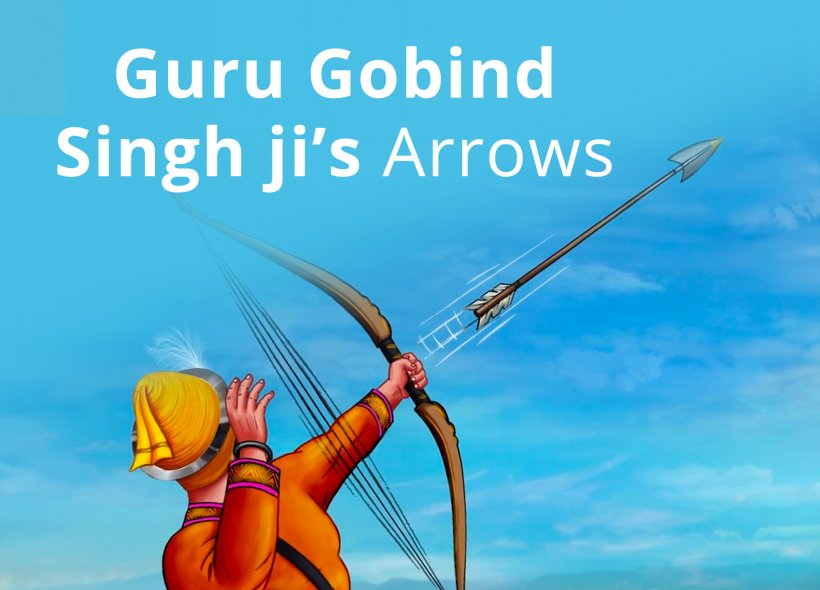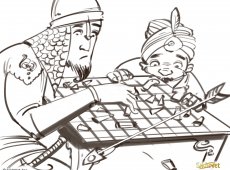Guru Ji's Arrow
Guru Gobind Singh Ji was not only a great teacher but he was also the greatest of warriors. He taught his Sikhs to meditate on the One in everyone and he also taught them to train their bodies.
His Sikhs trained very hard. They were tested constantly. Guru Gobind Singh ji also trained himself intensely and, while doing so, he never forgot God. He was always in bliss. He was so expert at shooting a bow that his arrows could go much farther than anyone else's arrows.
One time, emperor Aurangzeb sent an army to surround Anandpur Sahib where the Guru and his Sikhs were living. About two miles away the emperor's army set up camp. Anandpur was cut off from all food and water coming in.
One day two generals, named Zabardast Khan and Wajir Khan, were playing a game of chess in their camp. They didn't know that Guru ji was watching them from two miles away through his telescope. From the Anandpur fortress Guru Gobind Singh leaned back and shot an arrow high in to the sky. The arrow soared through the sky like it was happy to meet a new friend. It thwacked into leg of the bench on which the generals were sitting. "Huh?" "What was that?" Everyone got scared, "We are under attack!!" they yelled, "Run for shelter!"
After a little while, the whole camp became silent. Slowly, people came out of hiding. Wajir Khan pulled the arrow out of the leg of the bench and said, "Who would dare shoot an arrow at us!?! Whoever did it must be found and punished!"
A prince who lived near Anandpur said, "I recognize this arrow! It has a gold arrowhead on it, so it must be the arrow of Guru Gobind Singh." The Guru always put gold on his arrows so that the families of men killed in battle will be cared for after their death. The generals didn't believe him, "How could it be the Guru's arrow!? If he was close enough to shoot at us, we would have seen him and captured him."
Another prince who lived nearby spoke up, "Guru Gobind Singh is a very brave man. I have heard many stories of his heroism. He must have shot the arrow from the top of the Anandpur fortress." The generals laughed, From the top of Anandpur fort?! That's over two miles away. No one can shoot that far! The prince spoke again, "The Guru has special powers, two miles is not too much for him." Everyone who had been watching the chess game became very impressed. Wajir Khan got angry and yelled, "Silence you fools! Wherever this arrow came from, let us thank Allah we didn't get hit. Allah has protected us. Allah has made a miracle and saved our lives."
As they were about to sit down to start the chess game again, a second arrow soared through the sky. It hit the bench in exactly the same spot as the last one. Everyone freaked out, "Where is that coming from!?" "Save yourselves!" "I don't want to die!"
After everyone settled down Zabardast Khan said, "Come out, com out. It's safe." He noticed that there was a letter attached to this arrow. He said, "What is this? a letter? It's written in Persian. Ah, the language of kings! How superbly is this letter written!" Then he read the letter the Guru had written:
"This is not a miracle, I am not in favor of performing miracles. This skill comes only from practice. You think wrong; I was not trying to take the lives of Zabardast Khan or Wajir Khan. The first arrow was not meant to hit either one of you."
The generals were shocked, "I can not believe this, how did he shoot that far? He could have taken our lives, so why didn't he?" Guru ji's message to them was clear, the Sikhs will never give up. The Sikhs will always be kind but will also never surrender.
Guru ji always taught the Sikhs to to be become excellent in all things and to live their lives purely and simply. It is through discipline and practice that we can accomplish anything in life. It is through discipline and practice that we can become strong and we can help others.
Guru Ji says, "I do not love my Sikhs. It is their discipline that I love."

